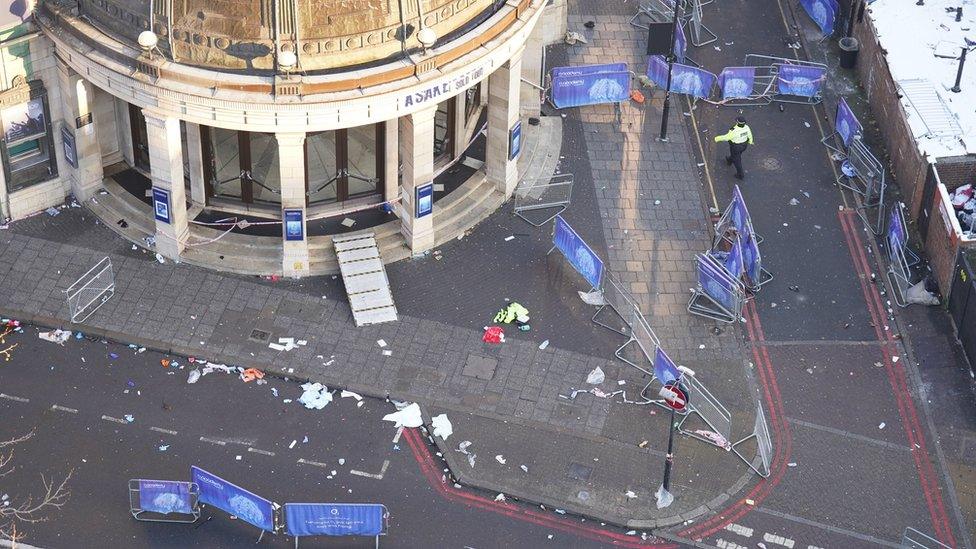O2 Academy Brixton crush: Claims of not enough medical cover
- Published
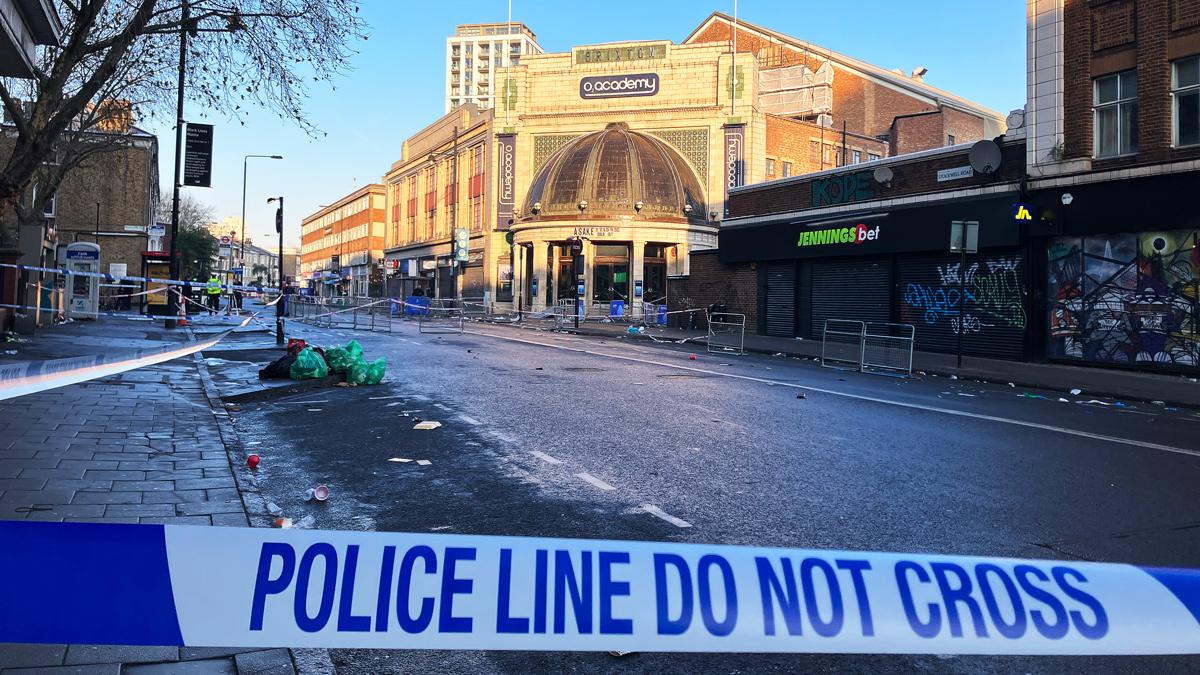
Only half the recommended number of medical staff were on duty at the O2 Brixton Academy on the night of a crush at the south-west London venue.
Industry guidelines suggest there should have been medical cover of at least 10 people, including a paramedic and a nurse.
After two insiders approached the BBC, the medical cover provider confirmed only five people were working when the crush happened in December.
No paramedics or nurses were present.
Rebecca Ikumelo, 33, and security guard Gaby Hutchinson, 23, died in hospital following the crowd surge on 15 December 2022, at the concert by Afrobeats artist Asake.
The medical provider, Collingwood Services Ltd, said it was "fully confident" its team had "responded speedily, efficiently and with best practice".
We approached the venue operator, Academy Music Group (AMG), for comment. It said it was unable to respond to specific questions, citing the police investigation into what happened.
Two whistleblowers who regularly work for Collingwood Services Ltd at Brixton told BBC Radio 4's File on 4 programme that medical cover at the south London gig had been "inadequate".
Neither of them was there when the crush happened, but one said he had spoken to colleagues who were.
The insiders told us that of the five people working for Collingwood at the venue, none had a paramedic qualification.
"[They] had two student paramedics, so they're basically unqualified," said one whistleblower. "They have to be supervised by a paramedic, not by anybody of a lower grade. They didn't have appropriate supervision."
To become a paramedic, you need to pass an approved Health and Care Professions Council (HCPC) course - which often means studying for three years to degree level.
Two of the three others working that night, say the insiders, were so-called "FREC 3s" - with a Level 3 certificate in First Response Emergency Care. They would normally have done a five-day course to learn skills for medical and trauma situations in pre-hospital settings.
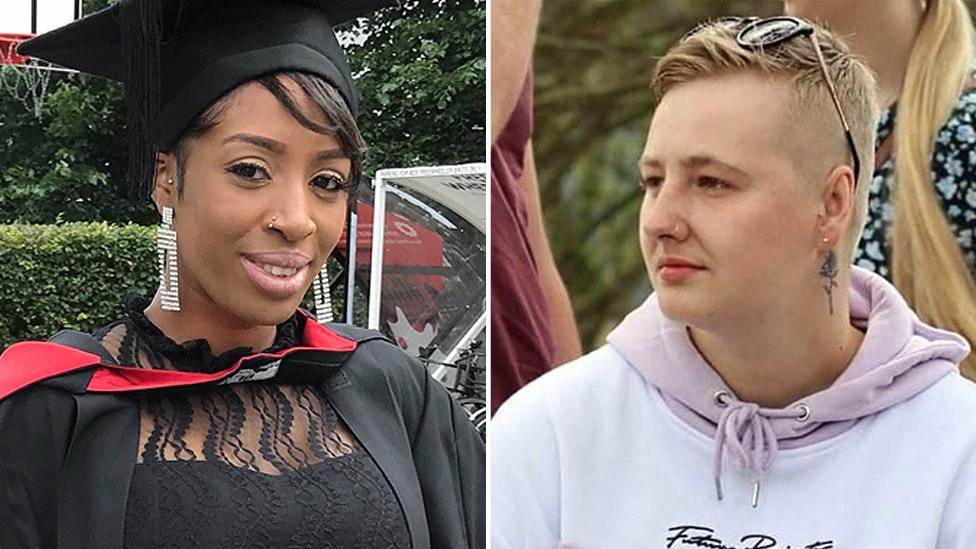
Rebecca Ikumelo and Gaby Hutchinson both died after the crush
We approached Collingwood Services Ltd who confirmed there had been five trained medical staff in attendance on site on the evening of 15 December. It said two of those had been first responders - which is a generic term which can cover a variety of competency levels.
The company also said there were two third-year student paramedics - working as lower grade emergency medical technicians (EMTs). The fifth person, said Collingwood, was also an EMT.
EMT is also a generic term which can cover different levels of competency in both the NHS and private medical sector. It is not a regulated qualification.
We asked the company to further clarify what qualifications the five Brixton staff held, but it refused to say - stating merely that "all staff present were qualified to carry out the scope of practice they were contracted to perform."
It also confirmed that "no member of staff was contracted to provide paramedic level duties at the event."
In addition, Collingwood told us a further team of three trained medical staff arrived at the Academy by 23:00 and were in attendance until 02:30.
Police have previously said they were called by venue staff at about 21:30.
London Ambulance Service says it was asked to attend at 22:06 - and that its staff treated 10 patients at the scene, eight of whom were transferred to hospital.

If you have any personal experience of the issues raised by this investigation, please email the File on 4 team at fileon4@bbc.co.uk

For a sold out, 5,000-strong audience gig at Brixton - such as the Asake show - industry-standard guidance suggests there should have been at least 10 people with medical training on duty.
That's double the number who were there when the crush happened.
Concert organisers across the UK use several tools to work out appropriate staffing levels.
They are likely to look back to similar events to judge what staff might be needed. File on 4 has previously reported that the Asake concert had been classed as "high risk" by Academy operator AMG.
Organisers also refer to detailed documents drawn up by the events industry itself - notably the A-Guide, external, from the National Arenas Association, and the so-called Purple Guide, external.
The Purple Guide is based on guidance formerly published by the Health and Safety Executive - and while it was originally drawn up for outdoor live events, it is now also used as a benchmark for indoor ones too.
The guide says events with between 3,000 and 10,000 attendees should have:
one or two paramedics or Emergency Care Practitioners
one or two nurses or Emergency Nurse Practitioners
six first aiders/first responders for the first 3,000 attendees - then one more for every additional 1,000
The following should also be considered:
doctor
rapid response vehicle
ambulance(s) and crew for on-site service and transfers to hospital
These latest claims about a lack of medical cover come just weeks after File on 4 reported that there might not have been enough security guards working on the night of the crush - and that some guards took bribes to let people into the gig without tickets.

Listen to File on 4: Catastrophe at the Academy on BBC Sounds

Both our whistleblowers said previous concerts at the Brixton Academy - before the Asake gig - also had not had enough Collingwood medical staff on duty.
"Very often they would just tell you the extra staff were running late," one told us, "but they would never turn up."
Collingwood also provides medical cover at another London venue run by AMG - the O2 Academy Islington.
One of the insiders sent us photos, taken since the Brixton crush, of out-of-date medical supplies which, he said, he had been expected to use at Islington.
They include:
a paediatric resuscitator bag and tubing - use-by date March 2019
nasopharyngeal airway tubes (that fit down the nose and throat) - use-by date January and June 2022
oxygen masks - use-by date August 2022
a defibrillator which should have been safety tested by September 2022
"I feel ashamed to be working for this organisation," he said. "If we had a Brixton-style incident at this venue [O2 Academy Islington] then I would not be able to operate effectively and people's lives would be at risk."

The whistleblowers told us they had both complained to Collingwood managers about inadequate staffing levels and training - and medical supplies being out of date.
Collingwood Services Ltd did not comment on those allegations when approached by the BBC.
In its statement, the company said it had conducted its own internal investigation and was fully confident that its team had "responded speedily, efficiently and with best practice" on the night of the Brixton crush.
"We believe strongly that the swift action and skill of medical staff, emergency services and others who assisted... were instrumental in avoiding further serious injuries or loss of life," it said.
"We are in full support of the investigation into the causes of the events of 15 December and welcome any outcomes of the ensuing report which would stop similar tragedies happening in the future."
Related topics
- Published18 January 2023
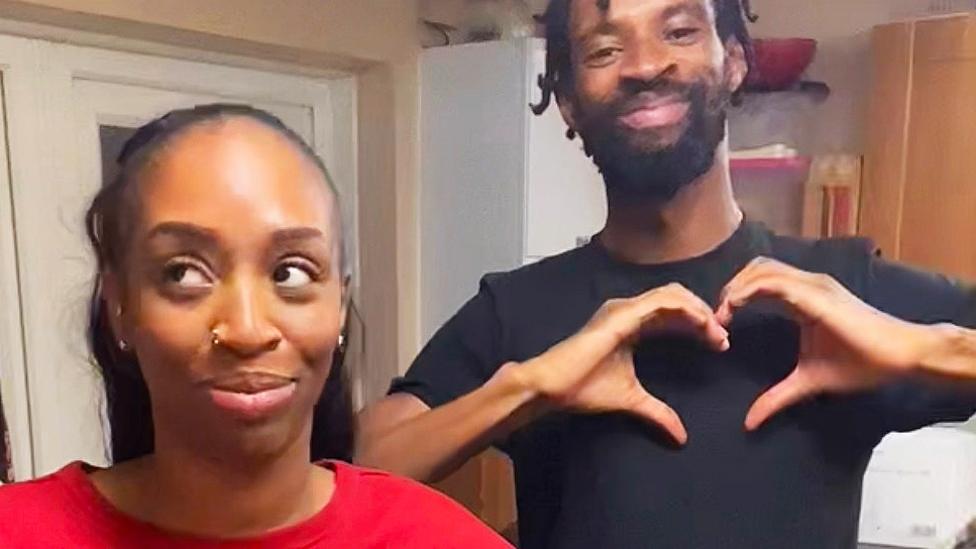
- Published16 January 2023
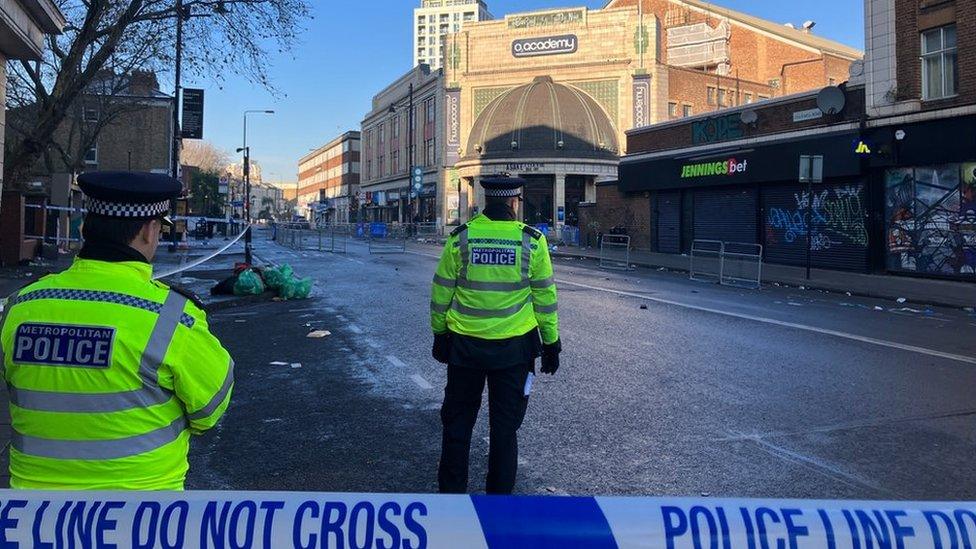
- Published19 December 2022
